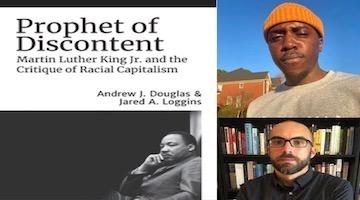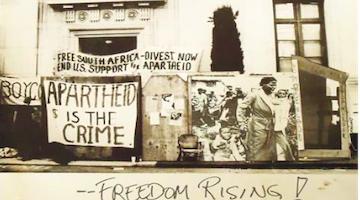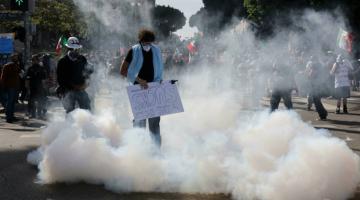The students imagined a new kind of university and a radical transformation of the world.
“They coupled their assault against Republican influence with a call for Black Studies.”
In this series, we ask acclaimed authors to answer five questions about their book. This week’s featured author is Joshua M. Myers. Myers teaches Africana Studies in the Department of Afro-American Studies at Howard University. His book is We Are Worth Fighting For: A History of the Howard University Student Protest of 1989.
Roberto Sirvent: How can your book help BAR readers understand the current political and social climate?
Joshua Myers: I think there is a need to understand that every generation has confronted the behemoth that we face today. We may learn from their struggles not only what we might accomplish, but how the nature of the thing we confront was constituted in the first place. So, a student protest from thirty years ago remains relevant not necessarily because it should be emulated, but because it further reveals what the political systems in place really are, where they came from. It also shows us that we are where we are—in this position to resist—because there are links in the chains that connect us to that past.
What do you hope activists and community organizers will take away from reading your book?
I would hope that they take away that it is not really helpful to paint universities in one broad stroke. Yes, it is critical to understand the role that they have played historically and today in the perpetuation of systems of inequality. But it is not always necessary or appropriate to conflate their institutional imprint with the communities of people that work there. Sometimes, we treat those who labor in these spaces as if they were the same as those whose function is to manage those spaces on behalf of capital. It is almost like blaming Amazon’s workers for Amazon’s politics. Hopefully, my work will show that what Fred Moten and Stefano Harney have called the “undercommons”—those spaces connected to, but beneath the official function of the university, matter to struggles for liberation. I would hope they take away also that there’s an important ethic of community solidarity that has made student struggle and the victories that did materialize possible.
We know readers will learn a lot from your book, but what do you hope readers will un-learn? In other words, is there a particular ideology you’re hoping to dismantle?
So much of what happens in the 1980s occurs against the backdrop of the rationalization of the neoliberalism that is now hegemonic. Perhaps that is the ideological foundations that student struggles sought to dismantle. There was, however, much more to it than the market fundamentalism that has so structured our realities today. Neoliberalism was also accompanied by an assault on culture, which lead to movements for multiculturalism and the defense of Western civilization. There are only a few books which think these two together. In my work, the students were aware of the connections, which is why they coupled their assault against Republican influence with a call for Black Studies. And of course, much of this has connections to the political and economic meanings of neoliberalism. One thing that my work does is chart its evolution and in the very next chapter it thinks with it as hip hop is being born. Those were major influences on the students at Howard as they sought to make particular claims on the university to speak to the global Black condition.
Who are the intellectual heroes that inspire your work?
There are numerous heroes that inspire all of my work. But here I must emphasize Sonia Sanchez. Her conversation with one of the protest leaders, April R. Silver, inspired the title of the text. But more than merely lending a voice of support, she was directly involved in the students’ activities, both materially and spiritually. She was their connection to the Black Radical tradition, an unbroken link in the chain. As scholars of Africana Studies, it is incumbent for us to remember that it was always the artists, the people whose job it was to imagine, that gave impetus to the spaces that were created for us. They were there first and we have to continue to honor that. But to also think what that means for us, for our work. Mama Sonia’s long history of building and cultivating Black spaces, of doing something different with the word, of inspiring new knowledges grounded in our experiences, is really the foundation for the dream of what Africana Studies can be.
In what way does your book help us imagine new worlds?
I am not sure that it does. In the final chapter, I gesture to hope that it might help us to see that what guided the protest was that they imagined a new kind of university and that it was not just a grievance that grounded the sacrifice of the students. Somehow, centrists in our political discourse are concerned that young people are asking for things that are not possible, that young people in the left have gone too far and are too sensitive, making them incapable of confronting the world around them. I would think that we need more sensitivity in this climate and more care. So to me, what the book signifies, even if it does not say so explicitly, is that at the root and foundation of the student struggle at Howard was a deep love for Black people as the foreground to a radical transformation of the world. That was the spirit of the protest. And it also is the spirit that could ground the new world we need. For what it suggests is that we love those whom this world has rendered as incapable of love, those for whom our love and loving can restart the world. But it is only now a hope that I have for the work.
Roberto Sirvent is Professor of Political and Social Ethics at Hope International University in Fullerton, CA. He also serves as the Outreach and Mentoring Coordinator for the Political Theology Network. He is co-author, with fellow BAR contributor Danny Haiphong, of the new book, American Exceptionalism and American Innocence: A People’s History of Fake News—From the Revolutionary War to the War on Terror.
COMMENTS?
Please join the conversation on Black Agenda Report's Facebook page at http://facebook.com/blackagendareport
Or, you can comment by emailing us at comments@blackagendareport.com



















